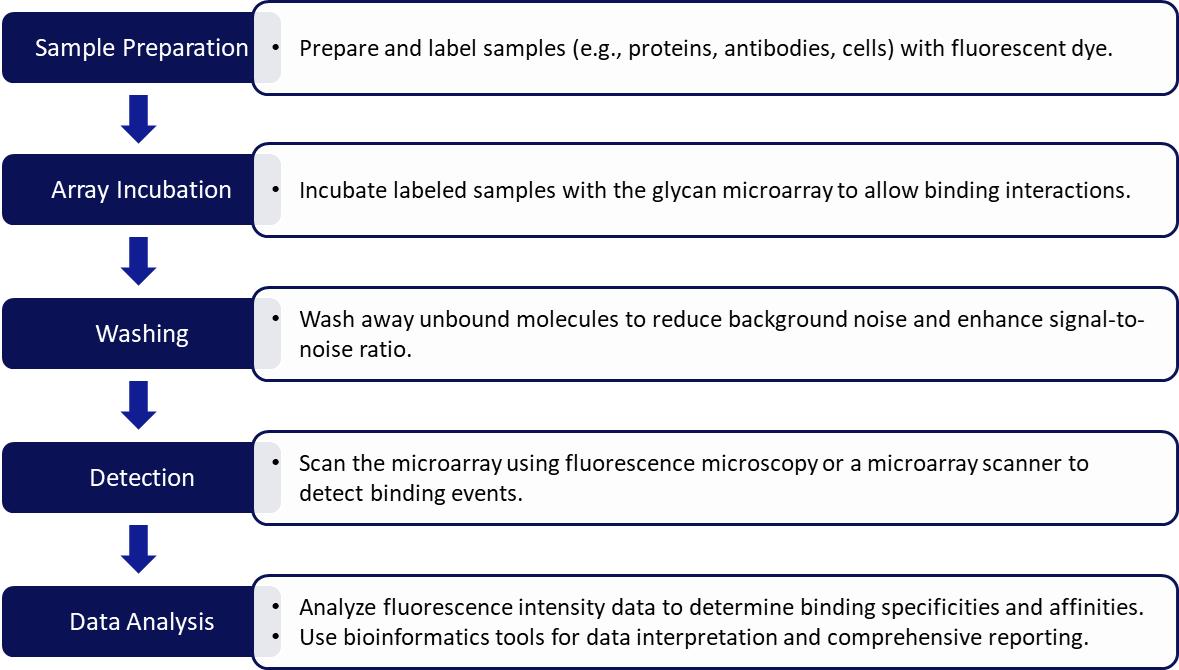What is Microbial Glycan Microarray?
Microbial glycan microarrays are sophisticated tools designed to analyze interactions between glycans (sugar molecules) and various biological entities such as proteins, antibodies, and cells. These arrays consist of a collection of diverse glycans immobilized on a solid surface, allowing high-throughput screening and analysis. Glycans play crucial roles in numerous biological processes, including cell-cell communication, pathogen recognition, and immune responses. Understanding glycan interactions is vital for advancing our knowledge in fields like immunology, microbiology, and disease research.
Principle of Microbial Glycan Microarray
The principle behind microbial glycan microarrays lies in their ability to facilitate the simultaneous analysis of numerous glycan-protein interactions. The process involves immobilizing a wide variety of glycans onto a solid surface, typically a glass slide or a silicon chip. When a sample containing potential glycan-binding molecules (such as antibodies, lectins, or cells) is introduced, these molecules interact with specific glycans on the array.
Detection of these interactions is usually achieved through fluorescent labeling. The sample is pre-labeled with a fluorescent dye, and binding events are visualized using fluorescence microscopy or a microarray scanner. The resulting data provides detailed information on binding affinities and specificities, enabling researchers to map glycan interactions comprehensively.
Microbial Glycan Microarray Assay Platform Offered by Creative Proteomics
Glycan-Protein Interaction Analysis
We provide comprehensive glycan-protein interaction analysis to help identify and characterize proteins that bind to specific glycans. This service includes:
- High-throughput screening of glycan libraries against protein samples.
- Quantitative analysis of binding affinities.
- Identification of glycan-binding motifs in proteins.
- Detailed binding specificity profiling.
Host-Pathogen Interaction Studies
Understanding the interactions between microbial glycans and host proteins is crucial for studying infections and developing therapeutic interventions. Our services in this area include:
- Analysis of microbial glycan interactions with host immune proteins (e.g., antibodies, receptors).
- Profiling of glycan-mediated adherence and invasion mechanisms.
Investigation of pathogen-specific glycan signatures.
Immune Response Characterization
We offer services to characterize immune responses to microbial glycans, which are important for vaccine development and immunotherapy. These services include:
- Mapping antibody responses to microbial glycan antigens.
- Analysis of serum or plasma samples for glycan-specific antibodies.
- Profiling of T-cell epitopes linked to glycan structures.
Glycan-Binding Lectin Identification
Lectins are proteins that specifically bind to glycans, and their study is essential for understanding cell recognition and signaling processes. Our platform provides:
- Identification and characterization of lectins from various sources.
- Determination of lectin binding specificities.
- Comparative analysis of lectin-glycan interactions.
Microbial Glycan Diversity Exploration
Exploring the diversity of microbial glycans can reveal new insights into microbial physiology and pathogenicity. Our services include:
- Comprehensive profiling of glycan structures in microbial samples.
- Comparative analysis of glycan compositions across different microbial species or strains.
- Identification of unique or rare glycan structures.
Custom Glycan Microarray Development
We understand that each research project has unique requirements. Therefore, we offer custom glycan microarray development services, including:
- Design and synthesis of custom glycan libraries.
- Integration of user-provided glycans into our arrays.
- Tailored experimental design and data analysis support.
Data Analysis and Bioinformatics Support
Our platform not only provides experimental services but also offers robust data analysis and bioinformatics support to ensure meaningful interpretation of results. This includes:
- Advanced statistical analysis of binding data.
- Visualization of glycan interaction networks.
- Bioinformatics tools for glycan structure-function relationship studies.
Consultation and Experimental Design
To maximize the success of your glycan interaction studies, we offer consultation services that include:
- Assistance with experimental design tailored to your research objectives.
- Recommendations for sample preparation and labeling strategies.
- Guidance on data interpretation and follow-up experiments.
Advantages of Our Microbial Glycan Microarray Platform
- High Throughput and Efficiency: Our platform allows for the simultaneous analysis of hundreds of glycan interactions, accelerating research and saving time and resources.
- Exceptional Sensitivity and Specificity: Utilizing state-of-the-art detection techniques ensures high sensitivity and specificity in identifying glycan-binding events, including low-affinity interactions.
- Comprehensive Glycan Library: Our extensive and diverse glycan library includes a wide array of microbial glycans, facilitating detailed studies across various microbial species.
- Customization and Flexibility: We offer customizable solutions, including the development of custom glycan libraries tailored to specific research objectives.
- Expert Support and Consultation: Our team provides expert support throughout the research process, from experimental design to data analysis and interpretation.
- Robust Data Analysis and Bioinformatics: We offer advanced data analysis and bioinformatics support, including statistical analysis, visualization of interaction networks, and tools to elucidate glycan structure-function relationships.
- Reproducibility and Reliability: Stringent quality control measures ensure highly reproducible and reliable results, crucial for generating data that can be confidently used for further research and application development.

Sample Requirements for Microbial Glycan Microarray
| Sample Type | Recommended Quantity |
|---|---|
| Protein (purified) | 10-20 µg |
| Antibody | 50-100 µg |
| Cells (suspension) | 1-5 x 10^6 cells |
| Serum/Plasma | 50-100 µL |
Applications of Microbial Glycan Microarray
Pathogen Detection and Identification: Profiling glycan interactions to identify and differentiate microbial species based on their unique glycan binding patterns.
Host-Microbe Interactions: Studying how microbes interact with host glycan structures to understand mechanisms of infection, colonization, and immune evasion.
Vaccine Development: Identifying glycan antigens on microbial surfaces for the design of glycan-based vaccines to enhance immune responses.
Antibiotic Development: Screening for microbial glycan targets to develop novel antibiotics that disrupt essential glycan-mediated processes.
Microbial Ecology: Investigating the role of glycans in microbial communities, including biofilm formation and inter-microbial communication.
Diagnostics: Developing diagnostic tools based on microbial glycan interactions for rapid and accurate detection of infectious agents.
Immune Response Analysis: Examining how the immune system recognizes and responds to microbial glycans to develop immunotherapies and improve understanding of immune responses.
Microbial Glycomics: Comprehensive profiling of microbial glycan structures to understand their diversity and functions in different microbial species.
Pathogenicity Studies: Exploring the role of glycans in microbial pathogenicity and virulence, providing insights into how pathogens cause disease.
Probiotic Research: Assessing the interactions between probiotics and host glycans to develop effective probiotic therapies that support gut health.




